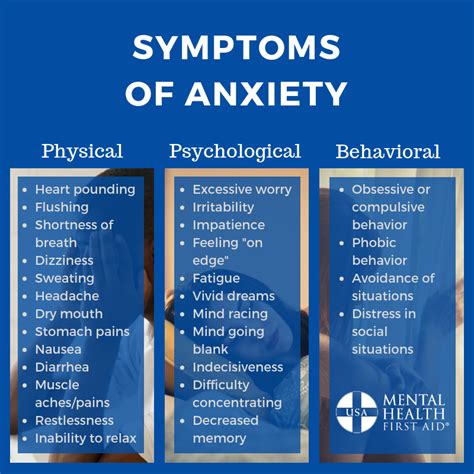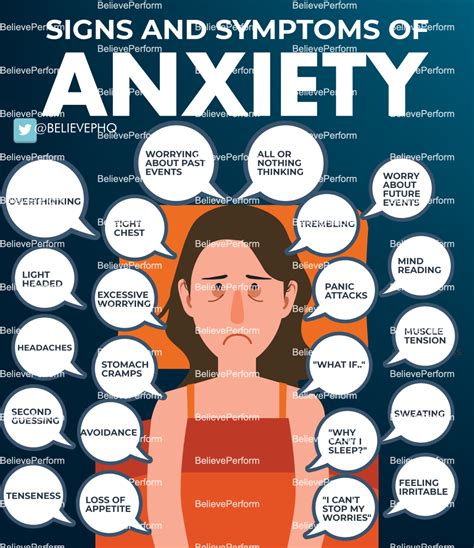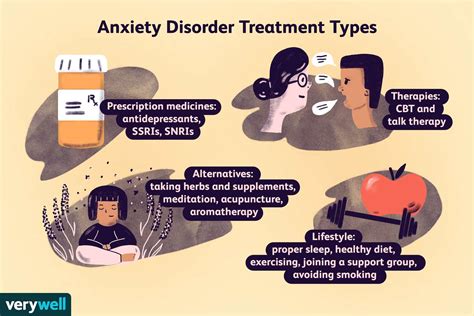Intro
Identify severe anxiety symptoms, including panic attacks, social anxiety, and phobias, to understand its impact on mental health, emotional well-being, and daily life, and learn coping strategies for anxiety disorders.
Anxiety is a common mental health condition that affects millions of people worldwide. While some level of anxiety is normal, severe anxiety can be debilitating and interfere with daily life. Recognizing the symptoms of severe anxiety is crucial for seeking proper treatment and managing its impact. Severe anxiety can manifest differently in various individuals, but there are common signs and symptoms that indicate its presence. Understanding these symptoms is essential for individuals to take control of their mental health and seek help when needed.
Severe anxiety can affect anyone, regardless of age, gender, or background. It is often triggered by stress, trauma, or significant life changes, but can also be caused by underlying medical conditions or genetic predisposition. The symptoms of severe anxiety can be physical, emotional, or behavioral, and may vary in intensity and frequency. Some people may experience anxiety as a constant feeling of fear or unease, while others may have panic attacks or obsessive thoughts. Recognizing the symptoms of severe anxiety is the first step towards seeking help and managing its impact on daily life.
The importance of addressing severe anxiety cannot be overstated. If left untreated, severe anxiety can lead to depression, substance abuse, and even suicidal thoughts. It can also affect relationships, work performance, and overall well-being. Furthermore, severe anxiety can exacerbate underlying medical conditions, such as heart disease, diabetes, and hypertension. By understanding the symptoms of severe anxiety and seeking proper treatment, individuals can regain control of their lives and improve their mental health. In this article, we will delve into the symptoms of severe anxiety, its causes, and treatment options, providing a comprehensive guide for individuals seeking help and support.
Symptoms Of Severe Anxiety

Severe anxiety can manifest in various ways, including physical, emotional, and behavioral symptoms. Some common symptoms of severe anxiety include:
- Rapid heartbeat and palpitations
- Sweating, trembling, and shaking
- Nausea, abdominal pain, and digestive issues
- Shortness of breath, difficulty breathing, and feeling of choking
- Dizziness, lightheadedness, and fainting
- Headaches, migraines, and muscle tension
- Insomnia, sleep disturbances, and fatigue
- Irritability, mood swings, and emotional reactivity
- Difficulty concentrating, memory problems, and confusion
- Avoidance behaviors, social withdrawal, and isolation
- Panic attacks, flashbacks, and nightmares
Physical Symptoms Of Severe Anxiety
Severe anxiety can cause a range of physical symptoms, including rapid heartbeat, sweating, and trembling. These symptoms are often triggered by the body's "fight or flight" response, which prepares the body to respond to perceived threats. Physical symptoms of severe anxiety can be debilitating and interfere with daily activities, making it essential to seek medical attention if they persist or worsen over time.Causes Of Severe Anxiety

Severe anxiety can be caused by various factors, including:
- Genetics: Family history of anxiety disorders
- Brain chemistry: Imbalance of neurotransmitters, such as serotonin and dopamine
- Life events: Trauma, stress, and significant changes
- Medical conditions: Underlying medical conditions, such as heart disease, diabetes, and hypertension
- Substance abuse: Withdrawal from substances, such as alcohol and benzodiazepines
- Personality traits: Perfectionism, low self-esteem, and sensitivity to stress
Environmental Factors Contributing To Severe Anxiety
Environmental factors can contribute to the development of severe anxiety, including: * Social media: Excessive social media use, cyberbullying, and online harassment * Work-related stress: High-pressure jobs, long working hours, and lack of work-life balance * Financial stress: Financial difficulties, debt, and economic uncertainty * Relationship issues: Conflict, abuse, and neglect in personal relationships * Lack of social support: Social isolation, loneliness, and lack of emotional supportTreatment Options For Severe Anxiety

Treatment for severe anxiety typically involves a combination of psychotherapy, medication, and lifestyle changes. Some effective treatment options for severe anxiety include:
- Cognitive-behavioral therapy (CBT): Helps individuals identify and change negative thought patterns and behaviors
- Medications: Antidepressants, benzodiazepines, and beta blockers can help alleviate symptoms of anxiety
- Relaxation techniques: Deep breathing, progressive muscle relaxation, and mindfulness meditation can help reduce stress and anxiety
- Exercise: Regular physical activity can help reduce anxiety symptoms and improve mood
- Social support: Building a support network of friends, family, and mental health professionals can help individuals cope with anxiety
Self-Help Strategies For Managing Severe Anxiety
In addition to seeking professional help, there are several self-help strategies that can help individuals manage severe anxiety, including: * Keeping a journal: Writing down thoughts, feelings, and experiences can help individuals process and release emotions * Practicing self-care: Engaging in activities that bring joy and relaxation, such as reading, listening to music, or taking a bath * Setting boundaries: Establishing healthy limits with others to reduce stress and anxiety * Building a routine: Establishing a daily routine can help individuals feel more grounded and in control * Seeking social support: Connecting with friends, family, or support groups can help individuals feel less isolated and more supportedConclusion And Next Steps

Severe anxiety is a treatable condition, and seeking help is the first step towards recovery. By understanding the symptoms, causes, and treatment options for severe anxiety, individuals can take control of their mental health and improve their overall well-being. If you or someone you know is struggling with severe anxiety, it is essential to seek professional help from a mental health expert. With the right treatment and support, individuals can learn to manage their anxiety and live a fulfilling life.
We invite you to share your thoughts and experiences with severe anxiety in the comments below. Your input can help others feel less alone and more supported in their journey towards recovery. Additionally, if you found this article helpful, please share it with others who may benefit from this information.
What are the most common symptoms of severe anxiety?
+The most common symptoms of severe anxiety include rapid heartbeat, sweating, trembling, nausea, abdominal pain, and digestive issues. Emotional symptoms may include irritability, mood swings, and emotional reactivity.
How is severe anxiety diagnosed?
+Severe anxiety is typically diagnosed through a combination of physical and psychological evaluations. A mental health professional will assess an individual's symptoms, medical history, and lifestyle to determine the presence and severity of anxiety.
What are the most effective treatment options for severe anxiety?
+The most effective treatment options for severe anxiety typically involve a combination of psychotherapy, medication, and lifestyle changes. Cognitive-behavioral therapy (CBT), medications such as antidepressants and benzodiazepines, and relaxation techniques like deep breathing and mindfulness meditation can help alleviate symptoms of anxiety.
